- Home
- D. H. Lawrence
John Thomas and Lady Jane
John Thomas and Lady Jane Read online
JOHN THOMAS AND LADY JANE
D H LAWRENCE
BLACKTHORN PRESS
Blackthorn Press, Blackthorn House
Middleton Rd, Pickering YO18 8AL
United Kingdom
All rights reserved. No part of this publication may be reproduced, stored in a retrieval system or transmitted, in any form or by any means, electronic, mechanical, photocopying, recording, or otherwise, without the prior permission of the Blackthorn Press.
2015
www.blackthornpress.com
CONTENTS
Introduction
Chapter I
Chapter II
Chapter III
Chapter IV
Chapter V
Chapter VI
Chapter VII
Chapter VIII
Chapter IX
Chapter X
Chapter XI
Chapter XII
Chapter XIII
Chapter XIV
Chapter XV
Chapter XVI
INTRODUCTION
Lawrence wrote three drafts of ‘Lady Chatterley’s Lover’ between 1926 and 1928: ‘The First Lady Chatterley’, ‘John Thomas and Lady Jane’ and the final version, ‘Lady Chatterley’s Lover’. All three books are published as ebooks by the Blackthorn Press.
Although all three books have the same story line of an aristocratic woman falling in love with a working class man, there are differences in their tone and sensibilities. Many critics have preferred this, the second version, for its greater depth of understanding between the two main characters and for the more detailed explanation of the character of Clifford Chatterley.
CHAPTER I
Ours is essentially a tragic age, so we refuse to take it tragically. The cataclysm has fallen, we’ve got used to the ruins, and we start to build up new little habitats, new little hopes. If we can’t make a road through the obstacles, we go round, or climb over the top. We’ve got to live, no matter how many skies have fallen. Having tragically wrung our hands, we now proceed to peel the potatoes, or to put on the wireless.
This was Constance Chatterley’s position. The war landed her in a very tight situation. But she made up her mind to live and learn.
She married Clifford Chatterley in 1917, when he was home for a month on leave. They had a month’s honeymoon. Then he went back to Flanders. To be shipped over to England again, six months later, more or less in bits. Constance, his wife, was then twenty-three years old, and he was twenty-nine.
His hold on life was marvellous. He didn’t die, and the bits seemed to grow together again. For two years, he remained in the doctor’s hands. Then he was pronounced a cure, and could return to life again, with the lower half of his body, from the hips down, paralysed for ever.
This was 1920. They returned, Clifford and Constance, to his home, the home of his family, Wragby Hall. His father had died, Clifford was now a baronet, Sir Clifford, and Constance was Lady Chatterley. They came to start housekeeping and a married life in the rather dilapidated home of the Chatterleys. Clifford had no near relatives. His mother had died when he was a boy. His brother, older than himself, was dead in the war. Crippled for ever, knowing he could never have any family, Clifford came home with his young wife, to keep the Chatterley name alive as long as he could, on a rather inadequate income.
He was not downcast. He could wheel himself about in a wheeled chair, and he had a bath chair with a small motor attached, so that he could drive himself slowly round the garden and out into the fine, melancholy park of which he was so proud, and about which he was so ironical.
Having suffered so much, the capacity for suffering had to some extent left him. He remained strange and bright and cheerful: almost, one might say, chirpy, with his ruddy, healthy-looking, handsome face, and his bright, challenging blue eyes. His shoulders were broad and strong, his hands were very strong. He was expensively tailored, and wore very handsome neckties from Bond Street. Yet even in his face one saw the watchful look, the intangible vacancy also, of a cripple.
He had so very nearly lost his life, that what remained to him seemed to him’ inordinately precious. One saw it in the brightness of his eyes, how proud he was of himself, for being alive. And he had been so much hurt, that something inside him had gone insentient, and could feel no more.
Constance, his wife, was a ruddy, country-looking girl, with soft brown hair and sturdy body and slow movements full of unused energy. She had big, wondering blue eyes and a slow, soft voice, and seemed just to have come from her native village. —
It was not so at all. Her father was the once well-known Scotch R.A., old Sir Malcolm Reid, and her mother had been an active Fabian, in the palmy days. Between artists and highbrow reformers, Constance and her sister Hilda had had what might be called a cultured-unconventional upbringing. They had been taken to Paris and Florence and Rome, artistically, and they had been taken in the other direction, to The Hague, and to Berlin, to great socialist conventions, when speakers spoke in every language, and no one was daunted. The two girls were not in the least abashed, neither by art nor by harangues. It was part of their world. They were at once cosmopolitan and provincial with the high-brow provincialism and the high-brow cosmopolitanism.
Clifford too had had a year at a German university, at Bonn, studying chemistry and metallurgy, and things connected with coal and coal-mines. Because the Chatterley money all came out of coal royalties, and out of their interest in the Tevershall Colliery Company, Clifford wanted to be up-to-date. The mines were rather poor, unprofitable. He was second son. It behoved him to give the family fortunes a shove.
In the war, he forgot all that. His father, Sir Geoffrey, spent recklessly for his country. Clifford was reckless too. Take no thought for the morrow, for the morrow will take thought for itself.
Well, this is the morrow of that day!
But Clifford, first lieutenant in a smart regiment — or what had been so — knew most of the people in Headquarters, and he was full of beans. He liked Constance at once: first, because of her modest-maiden, ruddy appearance, then for the daring that underlay her softness and her stillness. He managed to get the modern German books, and he read them aloud to her. It was so thrilling to know how ‘they’ felt, to have a feeler into the other camp. He had relatives ‘in the know’ and he himself therefore was in quite a lot of this same ‘know’. It didn’t amount to a great deal, but it was something to feel mocking and superior about, for young people who, like Clifford and Constance, were above narrow patriotism. And they were well above it.
But by the time the Untergang des Abendlands appeared, Clifford was a smashed man, and by the time Constance became mistress of Wragby, cold ash had begun to blanket the war fervour. It was the day after, the grey morrow for which no thought had been taken.
Wragby was a low, long old house in brown stone, rather dismal, standing on an elevation and overlooking a fine park beyond which, however, one could see the tall chimney and the spinning wheels of the colliery at Tevershall. But Constance did not mind this. She did not mind even the queer rattling of the sifting screens, and the whistle of the locomotives, heard across the silence. Only sometimes, when the wind blew from the west, which it often did, Wragby Hall was full of the sulphurous smell of a burning pit-bank, very disagreeable. And when the nights were dark, and the clouds hung low and level, the great red burning places on the sky, reflected from the furnaces at Clay Cross, gave her a strange, deep sense of dread, of mysterious fear.
She had never been used to an industrial district, only to the Sussex downs, and Scotch hills, and Kensington, and other sufficiently aesthetic surroundings. Here at Wragby, she was within the curious sphere of influence of Sheffield. The skies were
often very dark, there seemed to be no daylight, there was a sense of underworld. Even the flowers were often a bit smutty, growing in the dark air. And there was always a faint, or strong smell of something uncanny, something of the under-earth, coal or sulphur or iron, whatever it was, on the breath one breathed in.
But she was stoical. She had her life-work in front of her. She had Clifford, who would need her while he lived. She had Wragby, poor neglected old Wragby, which had been without a mistress for many years. And she had certain duties to the parish. She sat a few times in Tevershall old church, that stood blackened and mute, among a few trees, at the top of the hill up which the ugly mining village straggled for a long mile. But she was no church-goer: neither was Clifford. They gave the rector tea twice a year, and subscribed to charities, and let it go at that. Constance tried to get into touch a little with the miners’ wives. She wanted to know what the world was like. But the village was so grim and ugly, and the miners’ wives so evidently didn’t want her, she gave it up, and stayed mostly within the park gates.
Clifford would never go outside the park, in his chair. He could not bear to have the miners stare at him as an object of curiosity, though with commiseration. He minded both the curiosity and the commiseration. He could stand the Wragby servants. Them he paid. But outsiders he could not bear. He became irritable and queer.
So, also, they had very few visitors. The neighbours, the county, all called, most kindly and dutifully, when they knew the Chatterleys were back. Poor Clifford! That was it! Poor Sir Clifford Chatterley! in the war! so terrible! The Duchess of Oaklands came, with the Duke. And she was almost motherly. ‘If ever I can help you in anything, my dear, I shall be more than delighted. Poor Sir Clifford, we all owe him every kindness, every help we can give. And you too, dear!’ But then the Duchess looked upon herself as a very noble charity institution. ‘I live to do good among my neighbours.’
‘Thank God they’ve gone!’ gasped Sir Clifford. ‘I told them we could never go to Dale Abbey.’
‘But they were rather nice! — a bit pathetic, trying to do the right benevolent thing!’ said Constance softly.
‘By Jove, Connie, your neck must be more rubbery than mine, if you can stand it.’
Constance couldn’t stand it. But then she knew she wouldn’t have to. The Duke and Duchess would hardly come again. The same with the rest of the neighbours: Clifford was not popular, he was only pitied. He had always been too high-brow, too flippant, thought himself too clever and behaved in too democratic a fashion, to please the county. They knew he made a mock of them all. He had even pretended to be a sort of socialist, besides having written those pacifist poems and newspaper articles. There was no real danger in him, of course. The marrow of him was just as conservative as the Duke’s own. But he pranced about in that Labour-Party sort of way, and therefore you had to leave him to his prancing. The county knew perfectly well how to do it.
So that, after the ordeal of the first few weeks, Wragby soon became lonely again. Clifford would sometimes have his relatives on a short visit. He had some extremely ‘titled’ relations, on his mother’s side, and though he was so democratic, and put ‘bloody’ in his poems, he still liked the fact that his aunt was a Marchioness, and his cousin an Earl, and his uncle — well, whatever his uncle was. — He liked them to come to Wragby once a year, at least. There were Chatterleys too occupying permanent jobs in the government: good wires to pull, but not very exciting guests to have. And sometimes Tommy Dukes came. He was a Brigadier General now, but the same Tommy really: or an old Cambridge light, or another poet whose brief flower was blown, but who was still good company. Usually, when it was not some relation, it was just some lone man who smoked a pipe and wore strong brogue shoes, and was unconventional but frightfully cultured, and extremely nice to a woman but didn’t care for women, and was most happy when cornered alone with Clifford in a bachelor privacy. Constance was used to this sort of young man — no longer so very young. She knew all his sensitivenesses and his peculiar high-toned voice. She knew when she was de trop. She knew when ‘the men’ wanted to feel peculiarly manly and masculine and womanless, as if they were still in chambers in King’s or in Trinity. And she had her own sitting-room, up two flights of stairs. Clifford’s friends, though they were exceedingly kind and gentle, wincing almost, with her, were not really interested in her. She felt she jarred on them a little. So she withdrew.
But she and Clifford were a great deal alone. The months went by, even years passed. Clifford, with his eyes very wide open, bright, and hard, adjusted himself to the life he had to lead. He read a good deal, though he was not profoundly interested in anything. He never wrote any more. But sometimes he would take a small canvas and go out into the park to sketch. He had once loved trying to paint. Constance too made quaint drawings and illustrations for old books. Sometimes her illustrations were published; she had a little name for her work. Clifford was quite proud of it, and always sent ‘her’ books to his very titled relatives, though he knew they wouldn’t really admire her for showing such school-mistressy skill. Still, she was the daughter of an R.A., whom the nation had knighted. It was parvenu, but at least it was art in the authorized sense.
The great thrill in being alive began to wear off, with Clifford. At first, it had excited him terribly, to be able to puff his chair slowly to the wood, and see the leaves fall, see a squirrel gathering nuts, or a weasel bound across the path, or hear a wood. pecker tapping. A strange hard exultance would fill him. ‘I am alive! I am alive! I am in the midst of life!’ And when he saw a dead rabbit, which a stoat had caught and been forced to abandon, he thought. ‘Ha! So you are one more, are you, while I am alive!’ And when a little dog from the hall bounded in front of him, dancing with life, he would think: ‘Ah! you may skip! You are full of life and pep, but at the best you’ve only got a dozen years in front of you. A dozen years! I shall then be forty-six, in the prime of life. And your little life will be run out.’ — But at the back of his mind he would be thinking: ‘Shall I? Shall I live to forty-six? Shall I perhaps live to sixty? Twenty-six more years! If I have that, I can’t grumble.’ — And if he heard a rabbit scream, caught by a weasel or caught in a trap, his heart would stand still for a second, then he would think: ‘There’s another one gone to death! Another one! And I’m not gone!’ And he exulted curiously.
He never betrayed his preoccupation with death to Constance, but she divined it, and avoided the subject. But still she did not guess his strange, weird excitement when he took a gun, in the autumn, to have a shot at his pheasants: the strange, awful thrill he felt when he saw a bird ruffle in the air, and make a curving dive. Afterwards, he was grey and queer. And she tried to dissuade him from shooting. ‘It’s not good for your nerves, Clifford.’ And for a long time he would not touch his gun. Then, some evening, he would have to go out in his chair and sit waiting for a rabbit, or a bird. It was sport. But at the same time, when he saw a thing fall dead, a sudden puff of exultation and triumph exploded in his heart. And he was proud of his aim. And he thought a great deal of the preservation of his game.
After two or three years at Wragby, when he had settled down at last to the thought of being alive, and was used to himself as a cripple, the excitement which had kept him going began to die down in him. He became irritable and strained. He would sit for a long time doing nothing. Constance tried to get him interested in the old house, which needed repair, and in the small Wragby estate. But he would not bother. The Tevershall collieries were doing worse than ever, the Chatterleys’ inadequate income was dwindling.
‘You know a lot about mining, Clifford,’ she said. ‘Couldn’t you do something about the pits? Imagine if they have to close down, what a lot of misery for other people, as well as a strain for us.’
‘Everything will have to close down in the long run,’ he said, in his hard, abstract way.
‘We shall have to leave Wragby.’
‘Everybody that’s ever lived in Wragby, has had to leave
it, one day,’ said he. ‘So will you and I.’
To hear him like this chilled the life in her. He had a terrible passion of self-preservation. He was exacting about food, and ate rather too much than too little, not for the pleasure of eating, but to feed his life. His mind dwelled on the fact that he was feeding his life. He could not sleep, and that tortured him, because he felt he lost strength. It was not the loss of sleep he minded so much, it was the threat to his life. Then he could not bear to be worried about anything: everything must be kept from him, for fear it went to his nerves.
Constance, silent and dogged, plodded on from day to day. She had a silent, but very powerful will, which she had needed to exert. She set her will, when she came to Wragby, with Clifford, to seeing the thing through. Her marriage should still be a success. She willed it so, and she would never give in. Clifford could never be a husband to her. She lived with him a married nun, become virgin again by disuse. The memory of their one month of married life became unreal to her, barren. She would live virgin by disuse. To this also she set her mind and her will. And she almost exulted in it. Almost in cruelty against herself, with smooth rigour she repressed herself and exulted in her. barrenness.
For the first few years. And then something began to bend under the strain. She became abnormally silent, and would start violently if addressed suddenly. With the ponderous, slow heaviness of her will, she shut sex out of her life and out of her mind. It was denied her, so she despised it, and didn’t want it. But something was bending in her, some support was slowly caving in. She could feel it. And if she went, Clifford would go down with her, on top of her. She knew it.
Sometimes it seemed to her as if the whole world were a mad-house, Wragby was the centre of a vast and raving lunacy. She dreaded everything, herself most of all. But still she never gave in. She wept no single tear, she never pitied herself. With a steady, plodding rhythm she went on through the days, with a monotony that in itself was a madness. In the morning, she felt: now I’m getting up, now I’m washing myself, now I’m putting a dress on, the same green knitted dress! Now I’m going downstairs: the same stairs! now I’m opening Clifford’s door, and I’m going to say Good morning! to him: the same Good morning! the same Clifford behind the same door, the same me looking at him to see how he is! — The tick-tock of mechanistic monotony became an insanity to her.

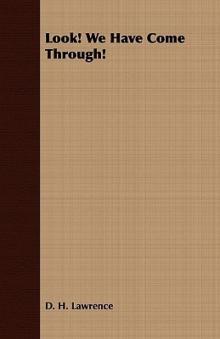 Look! We Have Come Through!
Look! We Have Come Through!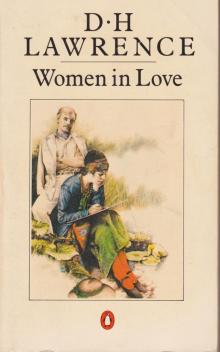 Women in Love
Women in Love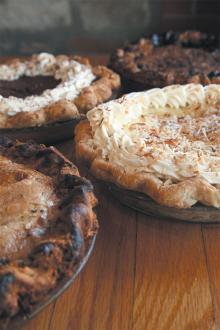 The Ladybird
The Ladybird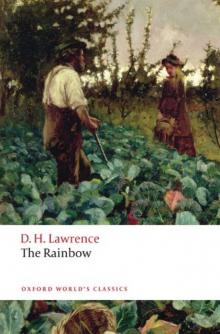 The Rainbow
The Rainbow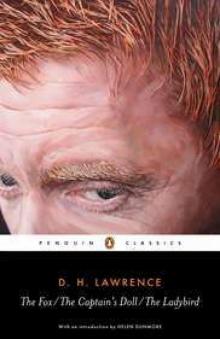 The Captain's Dol
The Captain's Dol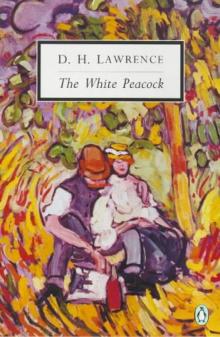 The White Peacock
The White Peacock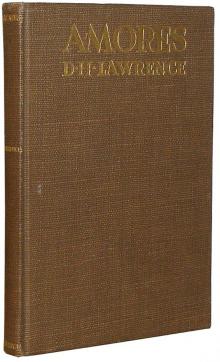 Amores
Amores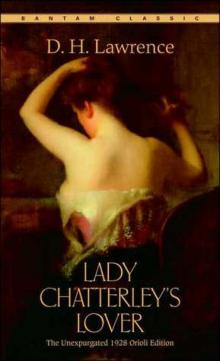 Lady Chatterley's Lover
Lady Chatterley's Lover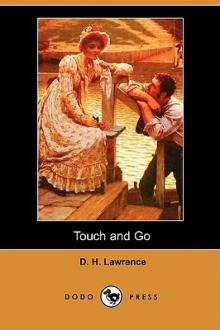 Touch and Go
Touch and Go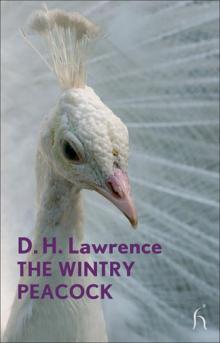 The Wintry Peacock
The Wintry Peacock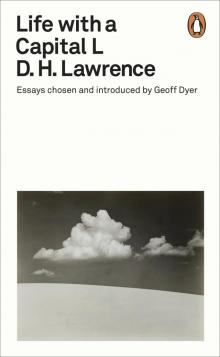 Life with a Capital L
Life with a Capital L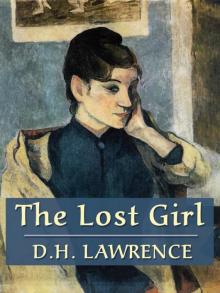 The Lost Girl
The Lost Girl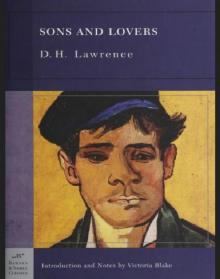 Sons and Lovers
Sons and Lovers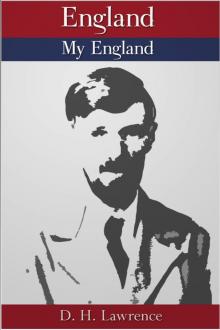 England, My England
England, My England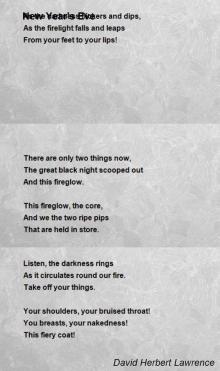 New Poems
New Poems Twilight in Italy
Twilight in Italy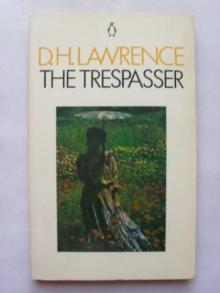 The Trespasser
The Trespasser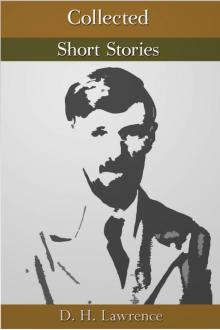 The Collected Short Stories
The Collected Short Stories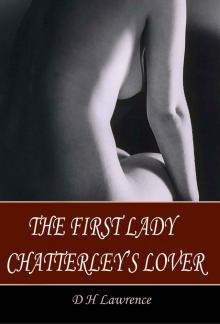 The First Lady Chatterley's Lover
The First Lady Chatterley's Lover Kangaroo
Kangaroo Bay
Bay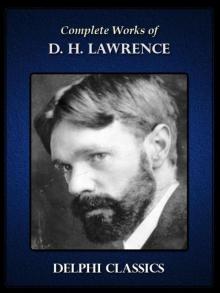 Complete Works of D.H. Lawrence
Complete Works of D.H. Lawrence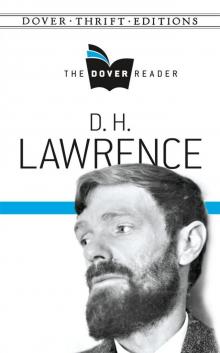 D H Lawrence- The Dover Reader
D H Lawrence- The Dover Reader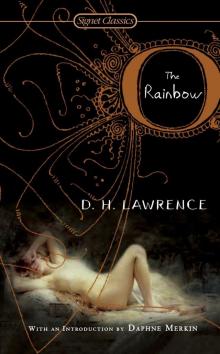 The Rainbow (100th Anniversary ed.)
The Rainbow (100th Anniversary ed.)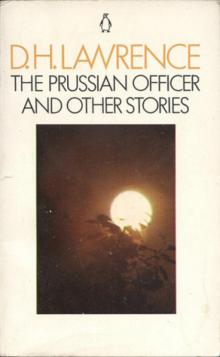 The Prussian Officer
The Prussian Officer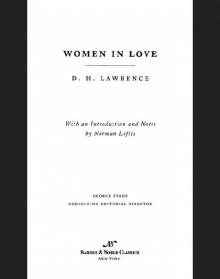 Women in Love (Barnes & Noble Classics Series)
Women in Love (Barnes & Noble Classics Series)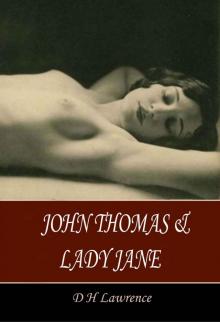 John Thomas and Lady Jane
John Thomas and Lady Jane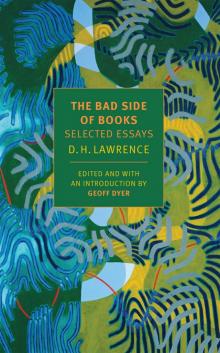 The Bad Side of Books
The Bad Side of Books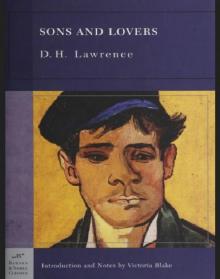 Sons and Lovers (Barnes & Noble Classics Series)
Sons and Lovers (Barnes & Noble Classics Series) Selected Stories
Selected Stories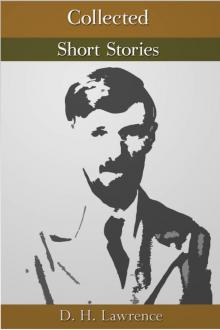 Collected Short Stories
Collected Short Stories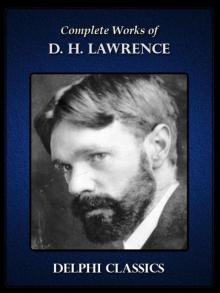 Complete Works of D.H. Lawrence (Illustrated)
Complete Works of D.H. Lawrence (Illustrated)